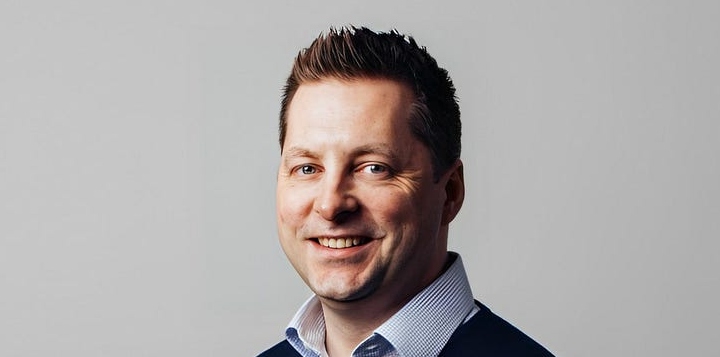Being open, authentic and ethical — People want to feel safe at work and know they can trust their leader to do the right thing. Build trust by communicating openly and be consistent between your words and actions.
We are living in the Renaissance of Work. Just like great artists know that an empty canvas can become anything, great leaders know that an entire organization — and the people inside it — can become anything, too. Master Artists and Mastering the Art of Leadership draw from the same source: creation. In this series, we’ll meet masters who are creating the future of work and painting a portrait of lasting leadership. As part of this series, we had the pleasure of interviewing Dan Hughes.
Dan Hughes is a business psychologist and Director of International R&D at Talogy. Dan has 25 years’ experience in researching and developing talent assessment and development solutions. He is passionate about applying psychology and behavioural science to support organizations to get the best out of their talent and to help individuals flourish at work. Over the last few years, he has conducted international research into perspectives on the future of leadership and what attributes leaders need to focus on to be effective moving forward.
Thank you for joining us. Our readers would enjoy discovering something interesting about you. What are you in the middle of right now that you’re excited about personally or professionally?
This year, I’m just beginning a professional doctorate which is personally really exciting. As a business psychologist focused on research and development, I’m really looking forward to diving into more scientific research around the area of people-centered leadership, and how leaders can help create working environments which help employees to thrive. If we can create more workplaces where employees have the conditions that enable them to flourish, that has benefits both for organizational performance and for people’s well-being, so it is a win-win for everyone.
We all get by with a little help from our friends. Who is the leader that has influenced you the most, and how?
It’s really hard to pick one. Across my career, I’ve been lucky to have had several leaders who have truly believed in me (often more than I have myself!) and given me the opportunities and challenges to develop my own leadership skills. Every leader I’ve worked for has had different strengths, and I’ve tried to learn from each of them in terms of what they excel at. I think that is important to do as a leader — you should always keep observing and learning from what you see other leaders around you do well and use that to inform your own style. Something that has influenced me most is working for some CEOs who have reached the top of their game yet retain a clear, genuine sense of humility and are far better leaders for this because they create engagement and empowerment across the organisation.
Sometimes our biggest mistakes lead to our biggest discoveries. What’s the biggest mistake you’ve made as a leader, and what did you discover as a result?
As something of a perfectionist, early on in my leadership career I felt like I had to have all the answers and if I didn’t then I wasn’t being a good leader. I think I tried to do too much myself rather than drawing on all the strengths, expertise and ideas of team members. That wasn’t good in terms of engaging people, I put a lot of pressure on myself, and ultimately it wasn’t good in getting to the best possible decisions. Fundamentally, leadership is about getting the best from people, and I learnt to bring people into decisions more and to give them room to decide how to achieve their goals.
How has your definition of leadership changed or evolved over time? What does it mean to be a leader now?
Expectations of leadership are continually evolving, in terms of what employees want and need from their leaders. The pandemic also accelerated some trends. At its heart, leadership is about positively influencing people to achieve important goals. To be effective, leaders need to recognize, appreciate and consider the perspectives, motives and needs of the people they lead. In my view, someone can only truly be a leader if people want to follow them, so leaders must be able to engage employees in their work and organizational goals.
From our own research at Talogy into the future of leadership, we know that employees are increasingly looking for more people-centered leadership. This has been accelerated by the pandemic, where employee well-being came even more to the fore. This isn’t to say that results aren’t important — of course they are critical — but this needs to be balanced much better with consideration for employees’ needs for autonomy, growth, and connection. Employees want clear purpose they can engage with, they want to be empowered, they want to have opportunities to develop, and they want to feel a sense of relatedness to others at work. If leaders can provide this environment for employees, then this will result in an engaged, happy, and ultimately productive workforce.
Success is as often as much about what we stop as what we start. What is one legacy leadership behavior you stopped because you discovered it was no longer valuable or relevant?
I’m naturally a very structured person and don’t like to leave things to chance. As a result, I can have too defined a view about how something could be done and lean towards being too directive about tasks. I still don’t get it right all the time, but I try to be much more conscious about empowering people to choose how to complete goals. Give people the autonomy and room to do things how they think best and don’t restrict them by defining how to do things — aim to give them “freedom with a framework”.
What is one lasting leadership behavior you started or are cultivating because you believe it is valuable or relevant?
To try to be self-aware and conscious about how you show up day to day — I think this is massively important leadership practice to try to cultivate. At any stage of your leadership career, self-awareness is a critical ingredient for continuous learning and improvement — it will be hard to improve if you don’t have this. I try to continually reflect on the impact I’m having, learn from where things didn’t go as well as I would like, and try my best to be humble about considering how I could do things better.
What advice would you offer to other leaders who are stuck in past playbooks and patterns and may be having a hard time letting go of what made them successful in the past?
My advice would be to recognize that it is a not a binary choice in leadership between focusing on results and focusing on people. Getting results at the expense of people’s well-being, growth and happiness is neither sustainable nor effective leadership, and it will not deliver better outcomes over the long term. Instead, it will lead to lower engagement and higher employee turnover. Interestingly, in our international research, we asked employees and leaders about what the key leadership behaviors were which impact most on achieving results and then also what the most important behaviors were for creating a positive employee experience. What we found is that it was virtually the same behaviors that people believe drive great results and a great employee experience. You don’t need to choose between these priorities — you can achieve both at the same time with the right approach.
Many of our readers can relate to the challenge of leading people for the first time. What advice would you offer to new and emerging leaders?
Be humble, be open to learning and reflect regularly on the impact you are having on the people you lead. It can take time to find your authentic leadership style and what works for both you and for the people you lead. At the same time, don’t be overly critical of yourself — leadership is incredibly difficult, and every leader has their strengths and weaknesses. You won’t get it right every time, but what is important is that you learn from your mistakes, take the lessons on board, and use them to become a better leader moving forward.

Based on your experience or research, what are the top five traits effective leaders exemplify now? Please share a story or an example for each.
In our research, we gathered perspectives from over 1,000 employees and 800 leaders internationally on what were the most important leadership attributes for achieving results, building a positive employee experience and responding to future challenges. These were the top five leadership attributes which emerged consistently across these perspectives, with an example of what they each look like in practice:
- Inspiring, motivating and engaging people — Give employees a ‘why’. People want to have a meaningful purpose in their work, so provide a compelling vision they can really engage with.
- Coaching and developing people — Help people to achieve mastery in their area of work. Give them honest, open and constructive feedback and find opportunities to stretch themselves.
- Being open, authentic and ethical — People want to feel safe at work and know they can trust their leader to do the right thing. Build trust by communicating openly and be consistent between your words and actions.
- Fostering collaboration, trust and respect — leaders set the tone, so it is important to role model an inclusive approach by giving everyone a voice, bringing people together, and capitalizing on their strengths.
- Empowering people to deliver — As a leader you don’t need to have all the answers. You need to show humility — set clear goals and expectations but give people the autonomy to choose how they can best meet these.
All these attributes are about people-centered leadership. Leaders who can demonstrate these five key attributes should be well-set for success.
American Basketball Coach John Wooden said, “Make each day your masterpiece.” How do you embody that quote? We welcome a story or example.
Every day, I try to be purposeful about how I show up at work to the people I lead. You have a huge responsibility towards the people you lead — the way you go about things and what you say can either have a big impact on whether they have a good day or bad day. I try my best to have a positive impact on people every day. If I know I haven’t had the impact I wanted, I try to take accountability and rectify it. When things go wrong, I strongly believe in looking at yourself first and thinking about what you could have done differently, rather than blaming others. Always start with yourself.
What is the legacy you aspire to leave as a leader?
That I tried my best to give people the autonomy, challenge and support that helped them to grow personally and to develop in their careers. It is hugely rewarding to see people I have managed achieving personal success and going on to do great things. If I have played some small part in helping someone’s career success, that is the legacy I would like to leave.
How can our readers connect with you to continue the conversation?
Readers can reach me at [email protected] and they can read more about our leadership research here: https://info.talogy.com/en-gb/leading-in-future-world-of-work.
Thank you for giving us the opportunity to experience a leadership master at work. We wish you continued success and good health!


